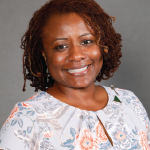Having completed her term as ARP president, Hazel L. Breland, PhD, OTR/L, FAOTA, CLA, has stepped into a new role as chair of the ARP’s Membership and Nominations Committee (https://www.rheumatology.org/Rheumatology-Professionals).
Dr. Breland is associate professor of occupational therapy at the Medical University of South Carolina (MUSC), Charleston, where she teaches graduate students and serves as the doctoral capstone coordinator for the entry-level Occupational Therapy Doctoral Program. She has been a member of the ARP since 2004, serving on its Executive Committee for the past five years as president (2019), president elect (2018), member at large/secretary (2017), chair of the ARP (then ARHP) Annual Meeting Planning Subcommittee (2016) and invited guest (2015). She served on the Annual Meeting Planning Subcommittee for four years before that.
Dr. Breland believes that occupational therapy, which helps people who have lost the ability to do many of the activities that are meaningful to them, including getting and keeping a job, is highly relevant to the autoimmune diseases and musculoskeletal conditions that rheumatologists address. Her professional interests also include access to care for underserved communities, an issue she observed growing up in rural South Carolina and has since studied academically.
The Rheumatologist (TR): How did your journey of volunteering with the ARP begin, and how did it lead to your new role?
Dr. Breland: During my graduate studies in rehabilitation sciences at the University of Pittsburgh, starting in 2002, I attended and presented at ACR conferences. As a student, I didn’t volunteer with the ARP, but once I transitioned into my faculty position at MUSC, I accepted a nomination to serve on the ACR/ARP Annual Meeting Planning Committee. The Annual Meeting is one of the most valuable benefits of ACR/ARP membership. People come and learn with and from each other, colleagues reconnect and members come to expand professional networks.
Once I completed my term as ARP president, I automatically transitioned to chair of its Membership and Nominations Committee, as well as the ARP liaison to our international rheumatology professional partners.
TR: What is the purpose of the ARP’s Membership and Nominations Committee?
Dr. Breland: Our charge relates to all membership recruitment and retention strategies and initiatives. Membership and Nominations oversees all aspects of nominations to ensure the election and appointment of qualified leaders and volunteers representative of the diversity of our membership. We also review nominations and select recipients for our merit awards, including those for graduate students. The work of this committee also depends on a close working relationship with the ARP’s experienced staff and all committee, subcommittee and task force chairs to facilitate a collaborative and productive process.
TR: Why is this work important?
Dr. Breland: Without members, you don’t have a membership organization. The ARP is the interprofessional division of the College. In most instances, ARP members come from professions that have their own professional associations. For myself, that would be the American Occupational Therapy Association. However, because of my passion for rheumatology, the ARP is also a professional home for me. And the ACR is the only U.S.-based professional organization that is home to all disciplines working in rheumatology.
It’s important rheumatologists and rheumatology professionals know about the ARP and appreciate the many member benefits across the College and from the Rheumatology Research Foundation that can enhance their professional development. ARP member benefits are relevant to the entire rheumatology team, including researchers, therapists (OT and PT), health educators, pharmacists, nurse practitioners, physician assistants, social workers, administrators and others. We are a diverse group, with more than 22 constituencies.
TR: What advances did the committee make in 2019 that you hope to continue to grow and evolve in this coming year?
Dr. Breland: This year, the Membership and Nominations Committee will implement the alignment, standardization and transparency of the ARP membership and nomination processes developed in 2019, facilitating a clear pathway of engagement for all members seeking a volunteer placement.
It’s also important that we inform the ARP membership that the nomination cycle for 2021 ARP volunteer opportunities [was] open until Feb. 1, 2020. All ARP members who plan to volunteer … are required to complete an online ARP volunteer nomination application. In addition, potential volunteers are required to submit a current résumé or [curriculum vitae] as documentation of the skills and expertise that reflect their qualifications as the best nominee for their preferred and ranked volunteer positions. Moreover, members must submit the annual ACR conflict of interest form as a component of the nominations process.
These changes promote alignment of processes across the College. We wanted to ensure consistency of ARP volunteer term limits, along with standardization and transparency, making the nomination processes more objective.
TR: How does the committee plan to reach new members in 2020?
Dr. Breland: We took a very strategic approach in 2018–19 to identify the priorities necessary to grow the ARP membership. To start, we increased awareness of the ARP within the College—beginning with members of ACR’s board of directors. Then we collegially challenged those same board members to ensure the rheumatology professionals in their clinics and on their teams joined the ARP. It’s essential to reach non-members to become members by enhancing their understanding of member benefits, the added value of ARP membership and the return on investment of being an engaged member volunteer.
Second, we launched the ARP’s membership campaign, Improving Lives Together, which highlights the rheumatology interprofessional team at work, caring for patients and improving lives together. In March 2019, ARP leaders visited College members at Low Country Rheumatology and Articularis Healthcare practices in Summerville, S.C. To view the campaign video, visit the ARP’s new web landing page at www.rheumatology.org/Rheumatology-Professionals.
We will continue to highlight all of the educational opportunities that are available to rheumatology professionals. Similarly, we will continue to remind our members of education, research and training funding available through the Rheumatology Research Foundation (https://www.rheumresearch.org).
TR: When and how should interested individuals get involved in volunteering for the ARP—or for Foundation positions requiring ARP membership?
Dr. Breland: The ARP membership data indicate that members recognize and appreciate the value of our professional organization when they contribute and are engaged in some way as volunteers. For someone who joins, as I did, as a graduate student and for new members, there are opportunities to participate on standing committees or special projects, to be a moderator of a session at the annual meeting, or to review educational and research proposals. There are many opportunities to get involved as a volunteer with the ARP and the Foundation.
TR: What about those who are interested but have little time to spare or to commit?
Dr. Breland: Special projects allow someone who has limited time but an interest in being a volunteer to share their expertise and talents. For example, the ARP Membership and Nominations Committee is calling all College members active on social media to link your social media accounts with the members of the ARP Social Media Ambassador Program.
Members seeking one or several short-term, low-commitment volunteer activities should consider engaging as an ARP special projects volunteer to help advance rheumatology initiatives related to advocacy, clinical practice, collaboration, diversity and inclusion, education, innovation, marketing, networking, publicity, research, technology or writing.
Visit https://www.rheumatology.org/Get-Involved/Volunteer/Special-Projects for more information about volunteering for the ARP’s special projects.
TR: What else would you like to say to readers of the magazine?
Dr. Breland: The ARP Membership and Nominations Committee takes seriously our charge to ensure the election and appointment of diverse and qualified leaders and members to volunteer positions. I’d like members to know the ARP and this committee are focused and intentional with one voice as we strive for a membership and a cadre of happily engaged volunteers who represent diversity of experience, race, affiliation, geography, discipline, culture, gender, perspectives, ethnicity, skills, generation, etc.
If an eligible and qualified ARP member with an interest in engagement as a volunteer completes the nominations process, this committee is committed to and welcomes the challenge of aligning member interests and College needs to promote the best fit for volunteer placements.
Finally, the ARP Membership and Nominations Committee is here to support member leaders and volunteers to be successful in their roles; thus, the College will be successful, with happily engaged members.
Larry Beresford is a medical journalist in Oakland, Calif.



